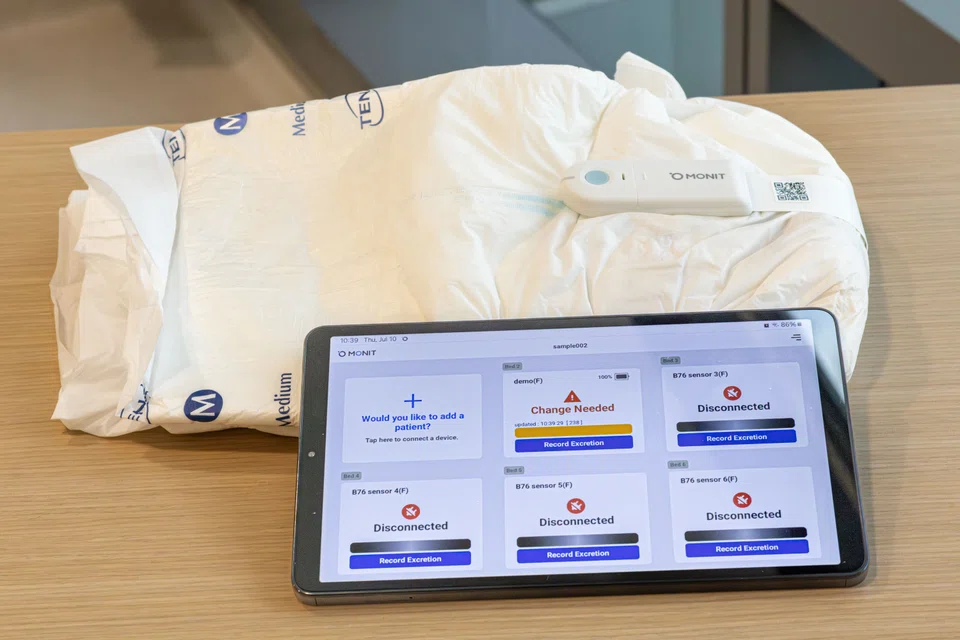'Smart diapers' for adult patients tested at KTPH to prevent rashes, reduce checks for nurses
Zhaki Abdullah for The Straits Times
A finger-sized device attached to adult patients' diapers could help prevent skin conditions while freeing up nursing staff from checking on patients multiple times throughout the day.
The device, developed by South Korean health tech company Monit, is connected to a 20cm-long strip with sensors. It is being tested at Khoo Teck Puat Hospital (KTPH) in a two-month-long trial.
The device aims to reduce cases of incontinence-associated dermatitis, such as inflammation, rashes or more serious skin conditions, caused by patients lying in soiled diapers for prolonged periods.
It can also relieve nurses from having to check diapers six times or more a day, a practice that can feel intrusive, the hospital said in a statement.
Patients with difficulty communicating or those with mobility issues stand to benefit the most from this innovation.
Monit's monitoring sensor is attached to the outside of the diaper using an adhesive. It detects the presence of urine or faeces in the diaper by monitoring factors such as temperature and humidity.
The sensor can be cleaned and reused when the diaper is changed.
Leveraging artificial intelligence (AI), the sensor analyses data to determine how badly soiled the diaper is and conveys the information in real time, translated into a colour-coded system on tablets the nurses carry, said KTPH general surgery senior consultant Clement Chia.
Ms Cherie Koh, senior nurse manager at KTPH, said this allows nurses to prioritise which patient needs to be attended to first, if multiple patients have soiled diapers.
In 2024, KTPH saw 33 patients with incontinence-associated dermatitis, Dr Chia said, noting that less mobile patients are at greater risk of infection since they may not be able to move to ventilate the area.
While the dermatitis in most cases results in irritation for patients, which can be resolved with basic skin care, more serious cases can lead to infections, requiring the use of antibiotics or even surgery in more extreme situations, he noted.
Providing nurses with real-time alerts via the "smart diapers" could help improve the situation.
"We want to prevent it from even happening in the first place," said Dr Chia, who is also the programme lead for KTPH's smart ward initiative.

The trial, which began on July 8, will focus on general medicine patients as well as those from the acute stroke unit, who are more likely to require incontinence care.
It will help the hospital determine how beneficial the use of the sensors is in the day-to-day care of patients.
As part of the trial, KTPH is testing the use of six sensors, with two currently in use.
The smart diaper trial is part of KTPH's first smart ward, located on the hospital's 10th floor.
The ward, with 33 beds, will employ technology such as a fall detection system, automated wheelchairs, smart wearables and bed turners to improve patient care.
The smart ward is being launched in conjunction with the 15th anniversary of KTPH, which is part of public healthcare cluster NHG Health.
NHG Health group chief research and innovation officer Tan Cher Heng said in a statement that the cluster - formerly known as the National Healthcare Group - embraces technology as an "enabler of better and more dignified care for patients".
"The use of AI in care innovations such as this smart diaper trial at KTPH exemplifies how we can harness smart solutions to improve comfort, prevent complications and support our nursing staff," Associate Professor Tan said.

See something interesting? Contribute your story to us.
Explore more on these topics
